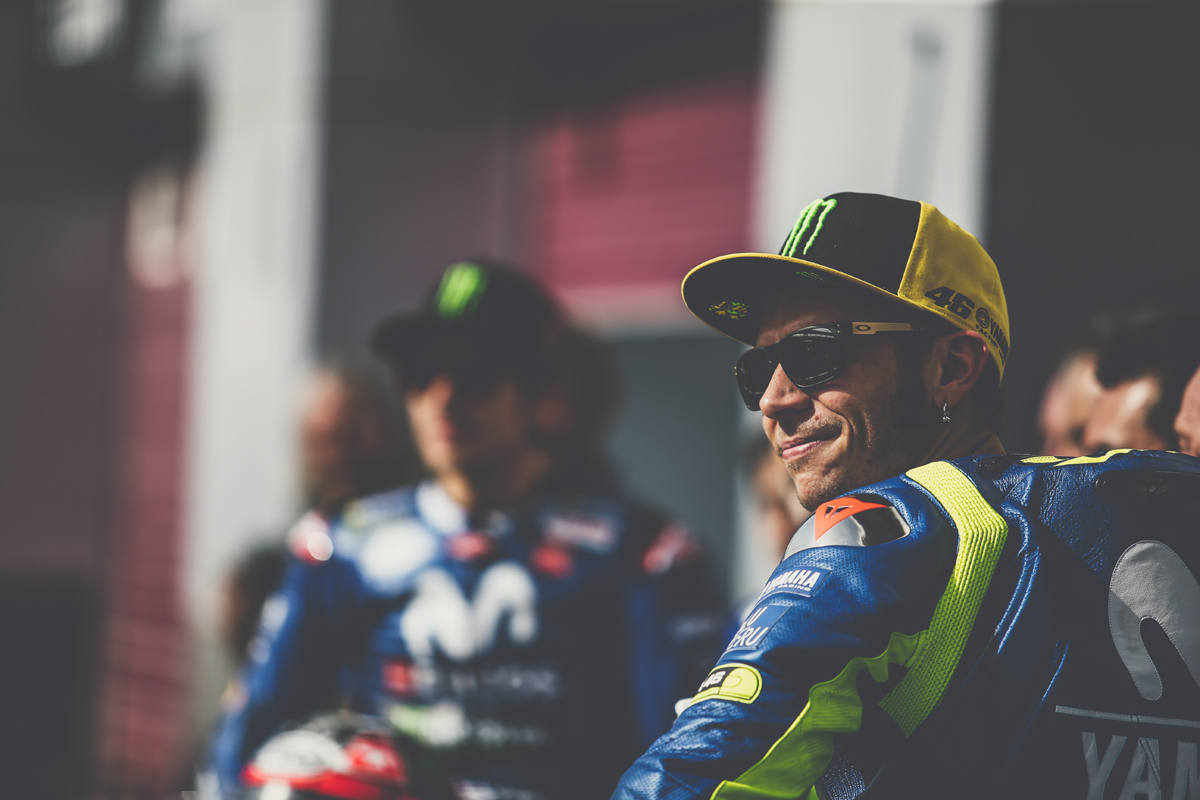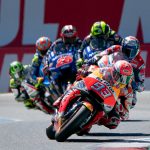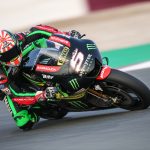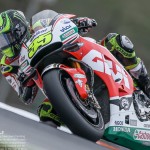On my way home from the opening race of the 2013 MotoGP season, I bumped into Nereo Balanzin, an Italian journalist and a lovely man, at Doha airport. We sat and chatted about the amazing debut of Marc Márquez, coming third just behind Valentino Rossi, and pondered the relationship between the two. Rossi had just beaten Márquez to second in a thrilling battle, in a special race for both of them, Rossi’s first back on a Yamaha after two years in the wilderness with Ducati, while Márquez was making his bow in the MotoGP class. It was exactly the kind of battle the two riders relished: closely fought and with every attack immediately answered with a counter attack.
After years of being in the minority among Casey Stoner, Jorge Lorenzo, and Dani Pedrosa, who all took a very puritanical approach to passing other riders with due care and attention, Rossi had found an ally with the same lust for action and refusal to either give or expect any quarter. “I think Valentino sees Marc as his heir,” Nereo mused. “He sees the same qualities in Marc which he has himself.” Nereo believed that Valentino Rossi would retire once he had racked up another championship, safe in the knowledge that the future of the sport was in good hands with Marc Márquez.

How times have changed. In Argentina, Rossi tore into Márquez, after the Spaniard had made a wildly irresponsible pass on the Italian, forcing the Yamaha out wide onto the grass and out of the points. “This is a very bad situation,” Rossi fumed. “[Márquez] destroyed our sport because he doesn’t have any respect for his rivals. Never. I’m scared on the track when I am with Márquez. I am scared today when I see his name on the board because I know that he is coming for me. I don’t have fun to fight with him, because I know that he raises the level. He doesn’t play clean. He doesn’t play aggressive. He plays dirty.”
The story of how Rossi went from potentially seeing Márquez as his heir to hating him on sight is a familiar one to anyone who follows MotoGP. First, there was a suspicion that Márquez was doing a reboot of the highlights of Rossi’s career: the collision with Jorge Lorenzo in the final corner at Jerez (reprising Rossi vs Gibernau in 2005); passing Rossi at Laguna Seca by running through the dirt at The Corkscrew (a remake of Rossi’s legendary pass on Casey Stoner in 2008). Then came 2015, and the pair clashed several times on track: Rossi clipped the front wheel of the Honda at Argentina causing Márquez to fall; Márquez tried to stuff his RCV inside Rossi’s Yamaha in the final chicane at Assen, and came off worse. In the press conference, any trace of fondness between the two had gone. Then came Sepang, Rossi’s accusations, the do-or-die battle between the two over the space of a couple of laps, then Rossi forcing Márquez wide and down. Rossi accused Márquez of helping Jorge Lorenzo to win the 2015 championship, in effect stealing it from him.
After the tragic death of Luis Salom at Barcelona put their feud into perspective in 2016, Rossi and Márquez were at least cordial with each other. The vitriol may still have been there, but it was kept behind closed doors. “I just say ciao to him, because it’s easier,” Rossi said after Argentina, revealing how uneasy the truce had actually been.

Will this rift ever be healed? The short answer to that question is no. It was inevitable that their relationship would descend into vendetta. The two most talented riders of their respective generations, each with egos demanding the respect that comes with that. In the two most powerful factory teams in racing, both of which demand influence over the running of the sport. Both men at the centre of powerful groups, seeking to have things run their way. If either Valentino Rossi or Marc Márquez demand a change – to procedure in Parc Ferme, to the order in which media debriefs are done, to the way the tyre allocation is organised – those changes are made.
The MotoGP paddock was never going to be large enough to contain two riders whose interstellar talent is only matched by the size of their egos. At some point, they would clash on track, bringing the off-track issues to a head. This is no longer even about a sporting rivalry. Valentino Rossi’s hatred of Marc Márquez burns with the intensity of a thousand suns. Márquez’ disdain for Rossi is as deep as the Pacific Ocean. There can be no reconciliation while the two occupy the same paddock. It is a law of nature.
And so we have another three seasons at least of bitter and angry rivalry, until Valentino Rossi (maybe) retires. And after that, Rossi managing a team of young riders whose primary objective will be to beat Marc Márquez to the championship. The tide of battle may ebb and flow, but the war goes on forever.
Photos by CormacGP








